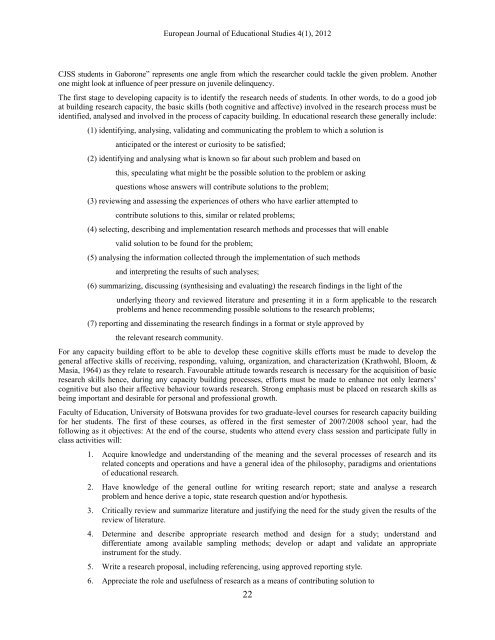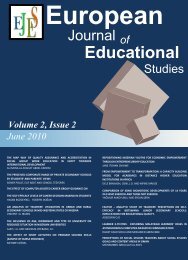Volume 4 Issue 1 (February 2012) - Ozean Publications
Volume 4 Issue 1 (February 2012) - Ozean Publications
Volume 4 Issue 1 (February 2012) - Ozean Publications
Create successful ePaper yourself
Turn your PDF publications into a flip-book with our unique Google optimized e-Paper software.
European Journal of Educational Studies 4(1), <strong>2012</strong><br />
CJSS students in Gaborone” represents one angle from which the researcher could tackle the given problem. Another<br />
one might look at influence of peer pressure on juvenile delinquency.<br />
The first stage to developing capacity is to identify the research needs of students. In other words, to do a good job<br />
at building research capacity, the basic skills (both cognitive and affective) involved in the research process must be<br />
identified, analysed and involved in the process of capacity building. In educational research these generally include:<br />
(1) identifying, analysing, validating and communicating the problem to which a solution is<br />
anticipated or the interest or curiosity to be satisfied;<br />
(2) identifying and analysing what is known so far about such problem and based on<br />
this, speculating what might be the possible solution to the problem or asking<br />
questions whose answers will contribute solutions to the problem;<br />
(3) reviewing and assessing the experiences of others who have earlier attempted to<br />
contribute solutions to this, similar or related problems;<br />
(4) selecting, describing and implementation research methods and processes that will enable<br />
valid solution to be found for the problem;<br />
(5) analysing the information collected through the implementation of such methods<br />
and interpreting the results of such analyses;<br />
(6) summarizing, discussing (synthesising and evaluating) the research findings in the light of the<br />
underlying theory and reviewed literature and presenting it in a form applicable to the research<br />
problems and hence recommending possible solutions to the research problems;<br />
(7) reporting and disseminating the research findings in a format or style approved by<br />
the relevant research community.<br />
For any capacity building effort to be able to develop these cognitive skills efforts must be made to develop the<br />
general affective skills of receiving, responding, valuing, organization, and characterization (Krathwohl, Bloom, &<br />
Masia, 1964) as they relate to research. Favourable attitude towards research is necessary for the acquisition of basic<br />
research skills hence, during any capacity building processes, efforts must be made to enhance not only learners‟<br />
cognitive but also their affective behaviour towards research. Strong emphasis must be placed on research skills as<br />
being important and desirable for personal and professional growth.<br />
Faculty of Education, University of Botswana provides for two graduate-level courses for research capacity building<br />
for her students. The first of these courses, as offered in the first semester of 2007/2008 school year, had the<br />
following as it objectives: At the end of the course, students who attend every class session and participate fully in<br />
class activities will:<br />
1. Acquire knowledge and understanding of the meaning and the several processes of research and its<br />
related concepts and operations and have a general idea of the philosophy, paradigms and orientations<br />
of educational research.<br />
2. Have knowledge of the general outline for writing research report; state and analyse a research<br />
problem and hence derive a topic, state research question and/or hypothesis.<br />
3. Critically review and summarize literature and justifying the need for the study given the results of the<br />
review of literature.<br />
4. Determine and describe appropriate research method and design for a study; understand and<br />
differentiate among available sampling methods; develop or adapt and validate an appropriate<br />
instrument for the study.<br />
5. Write a research proposal, including referencing, using approved reporting style.<br />
6. Appreciate the role and usefulness of research as a means of contributing solution to<br />
22

















